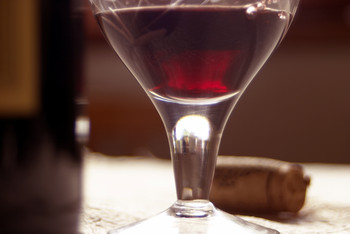| Liquid assets: thinking of investing in wine? A discerning mind is just as important as a discerning palate when considering your options
IN THE FILM Sideways, Virginia Madsen's character describes wine as "constantly evolving and gaining complexity." Sure, but is it constantly gaining value? Is it a good investment?
 Generally, the answer is no. The few wines that are made to age tend to be expensive and difficult to buy, store and sell. It takes serious know-how and connections to play this game, and still, there's no guarantee you'll make money. A study conducted by economics professor Joyce Jacobsen of Wesleyan University in Connecticut and Lehman Bros. investment analyst Benjamin J. Burton followed red Bordeaux wines--the world's most exclusive--over a decade and found they appreciated about half as quickly as the major stock indexes. Generally, the answer is no. The few wines that are made to age tend to be expensive and difficult to buy, store and sell. It takes serious know-how and connections to play this game, and still, there's no guarantee you'll make money. A study conducted by economics professor Joyce Jacobsen of Wesleyan University in Connecticut and Lehman Bros. investment analyst Benjamin J. Burton followed red Bordeaux wines--the world's most exclusive--over a decade and found they appreciated about half as quickly as the major stock indexes.
That said, nontraditional investments such as wine are gaining traction among upper-income investors looking to diversify their risks. And wine often does relatively well when stocks are in the dumps. So if you have a bit of money you don't mind risking, there are a handful of wine-investing options.
Wine funds pool investors' assets to buy and hold the high-quality stuff. These tend to have hedge-fund-like cost structures, which means they aren't cheap. Some have already run into financial trouble and appear to be on the unreliable side. Another option is to go through a brokerage and buy wine futures, much like you would for soy beans or crude oil. However, these might turn out to be worthless if the wine doesn't appreciate fast enough. If you're determined to invest in wine, though, probably the most satisfying route is to build a cellar, get professional advice about filling it, and then hope for the best. If worse comes to worst, you can still drink your losses.
SCOTT BERNARD NELSON is deputy business editor at The Oregonian and a freelance writer in Portland, Oregon. | 
